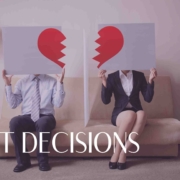
How to Avoid Divorce Burnout
As a family law attorney, you’ve chosen, as a career, an emotionally violent sport. Divorce is hard. It’s challenging. You spend a good portion of your days seeing, and dealing with, people at their absolute worst. Unfortunately, they sometimes take it out on you.
I’m in this boat, too. As a CPA, a CERTIFIED FINANCIAL PLANNER® professional, and a Certified Divorce Financial Analyst® professional who specializes in helping women with the financial side of divorce, I live it every day. Plus, I’m divorced.
I’m sure that people ask you—they sure ask me—if you ever “burn out” on divorce.
My answer: Yes. Of course. It’s impossible not to.
That said, there are ways, which I’d like to share with you here, to minimize the collateral damage to your emotional wellbeing, your practice, and your career.
This won’t be easy
I worked with a great divorce lawyer for years who finally left the field and chose another type of law to practice, knowing that she’d need to start at the bottom rung. (I can’t exactly blame her. The impetus for her decision was that, tragically, she had three clients die in one year, including one who walked out of mediation only to get struck by a car and killed.)
As I noted above, when you work in divorce, you see people at their worst. But think of the flip side of that: After the divorce, they, generally, only get better. I spoke to an attorney the other day who had just gotten a call from a client, a few years after the divorce, and didn’t even recognize her on the phone. That’s how much she had improved.
In that regard, I have a little edge over you. I continue to work with women, post-divorce, to rebuild their financial lives. So, I get to see them come full circle, becoming happy, normal, and confident.
But there are still things you can do to minimize the fallout.
The emergency room
Here’s an analogy for you: Think of the emergency-room doctor who must treat an injured child. There’s a good chance that doctor has a child, too. But the doctor has learned how to compartmentalize, to focus on their professional role in that situation.
I’m sure you do the same thing. It’s a basic coping mechanism.
But here’s something you might not be doing: You need to take an intentional approach to your work/life balance. It’s easy to get sucked into cases and end up working all the time.
Don’t. Leave space for other things—about your work, and about your life—that bring you joy. Make it an ingrained part of your practice’s culture. It’s good for you, and everyone else in the office.
Here’s one other thing you might not have thought of, which also helps: Talk to me. I’m not a paralegal. I’m not a client. I’m a peer. Many times, when I sit down with attorneys, they will just vent to me: about something the client said or did, or how they acted in a case… I’m a safe, professional person you talk to—oh, and by the way, I can also help your clients get better settlements, and move your case load along faster.
Contact me and let’s chat.




